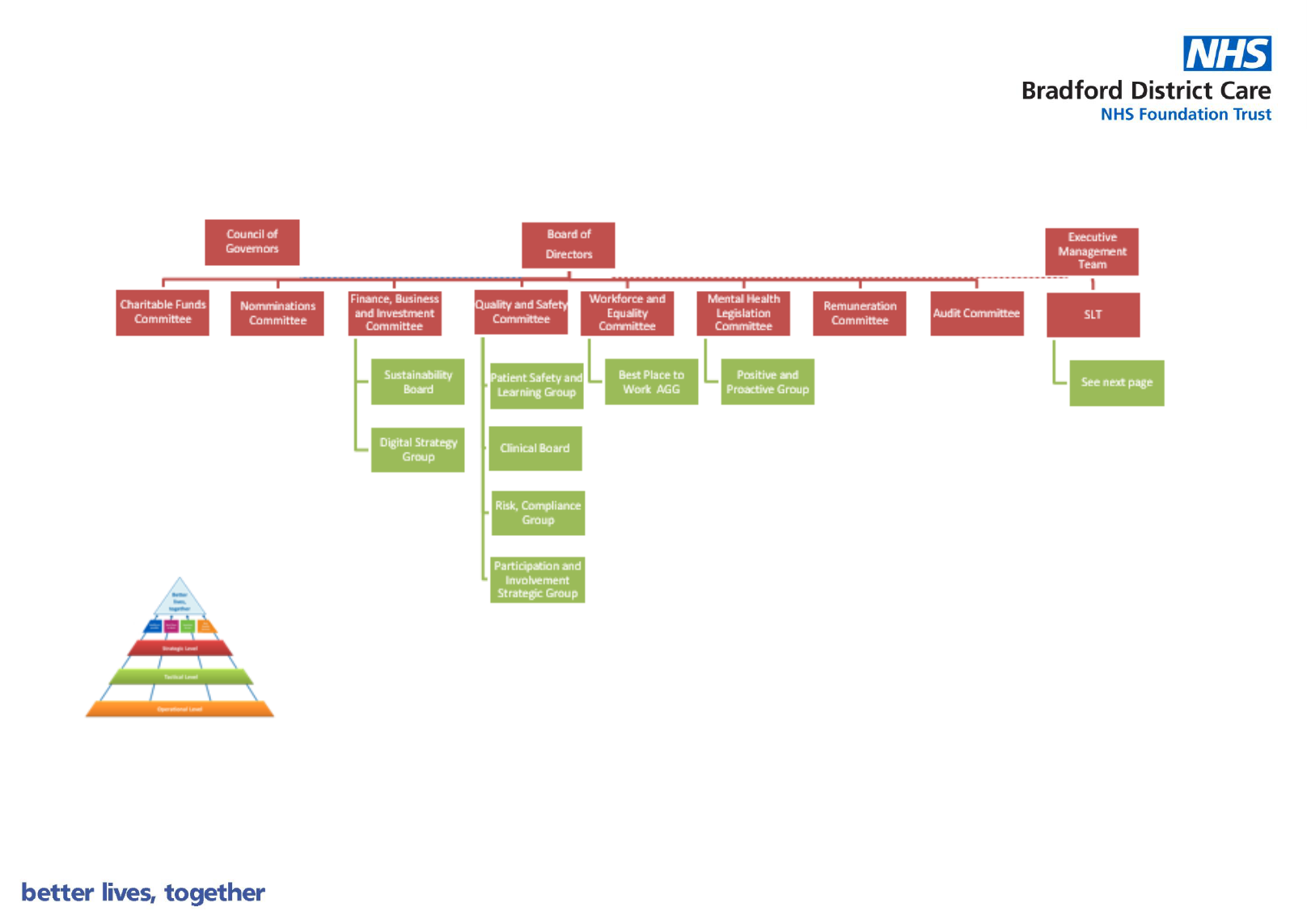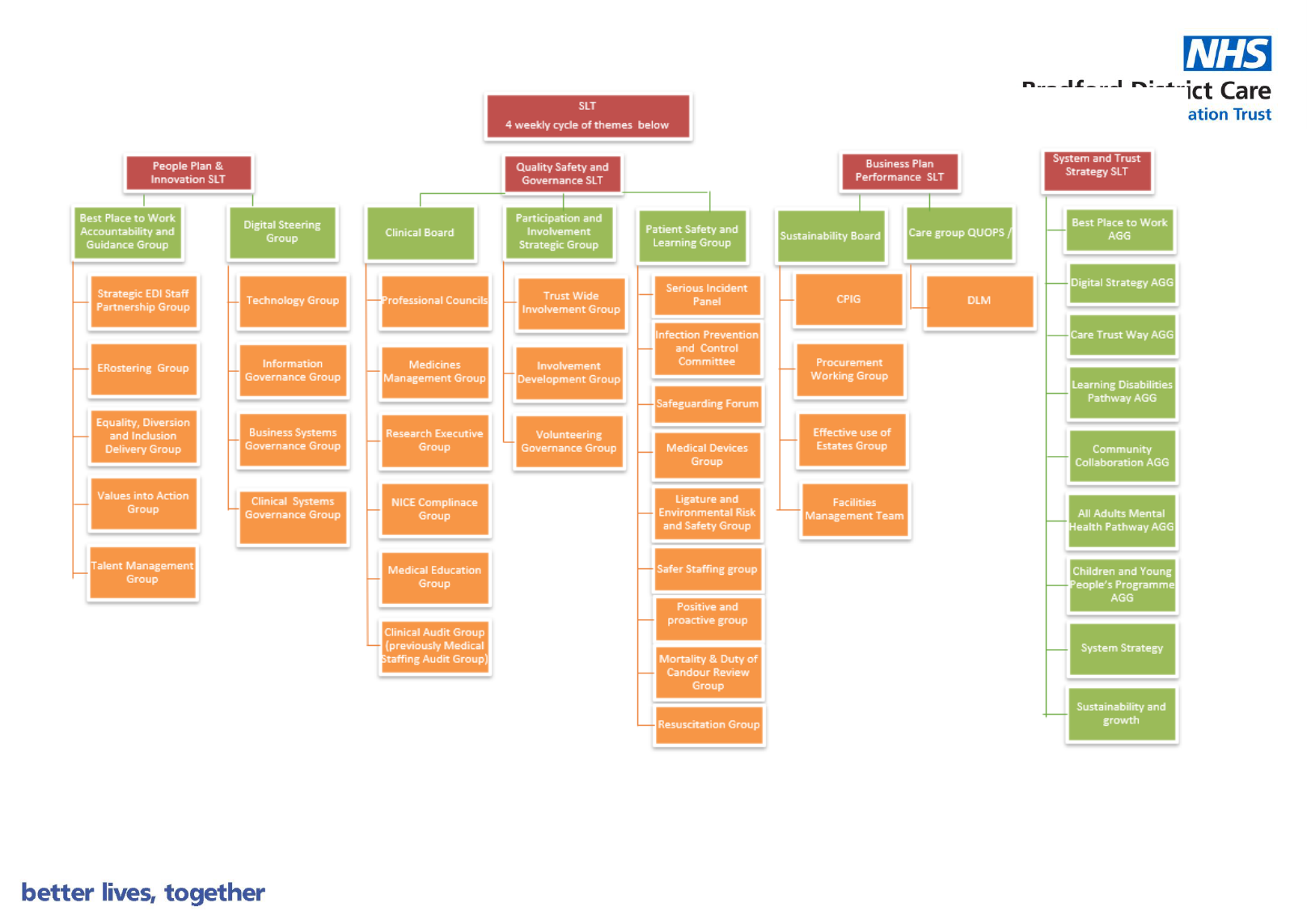
Page 1 of 10
Senior Leadership Team
Terms of Reference
Approved : 18 November 2020
Date to be reviewed : November 2021
1 Name of group / committee
Senior Leadership Team (SLT) of the Bradford District Care NHS Foundation Trust
(Trust).
2 Composition of SLT
Members: full rights –
Title
Chief Executive
Director of Finance, Contracting and Facilities
Chief Operating Officer
Director of Human Resources and Organisational Development
Director of Corporate Affairs
Chief Information Officer
Director of Nursing, Professions and Care Standards
Medical Director
General Managers (Mental Health; and Adult and Children’s Community)
Deputy Director of Finance
Deputy Director of Human Resources and Organisational Development
Deputy Director of Estates
Deputy Director of Nursing
Deputy Director of Patient Safety, Risk and Compliance
Deputy Medical Director
Associate Medical Director
Deputy Director of Performance and Planning
Head of Psychological Therapies
Head of Allied Health Professionals
Heads of Nursing (Mental Health and Physical Health)
Chief Pharmacist
In addition to anyone listed above, the Chair of SLT may also request individuals to
attend on an ad-hoc basis to provide advice and support for specific items from its
work plan when these are discussed in the meetings.

Page 2 of 10
3 Quoracy
Number: The minimum number of members for a meeting to be quorate is six, two of
whom must be executive directors. Attendees and deputies do not count towards
quoracy, unless the deputy is there in official ‘acting up’ arrangements.
If the Chair is unable to attend the meeting, and if otherwise quorate, the meeting will
be chaired by the nominated Deputy Chair.
Deputies: Where appropriate members may nominate deputies to represent them at
a meeting. A schedule of deputies, attached at appendix 1a, should be reviewed at
least annually to ensure adequate cover exists.
Non-quorate meeting: Non-quorate meetings may go ahead unless the Chair
decides not to proceed. Any decisions made by the non-quorate meeting must be
reviewed at the next quorate meeting.
4 Meetings of the SLT
Frequency: Weekly.
In order to enable the relevant business of the organisation to be conducted effectively
through SLT, each monthly cycle of SLT meetings will have subject-specific agendas
as described below:
Week 1: Quality, Safety and Governance
Week 2: Business Plan Performance
Week 3: System and Trust Strategy
Week 4: People Plan and Innovation
Week 5: (where there are 5 weeks in a month) SLT development
The cycle of meetings will be fixed and not subject to change without formal review of
these Terms of Reference
Urgent meeting: Any SLT member may request an urgent meeting. They will do so
by contacting the Chair.
Minutes: The Committee Secretariat will be provided by the Executive Support Team.
5 Authority
Establishment: SLT has been constituted as the first tier executive decision-making
group of the Trust. As such it is considered a strategic group which receives assurance
and accepts escalation from a number of tactical sub-groups, which themselves
receive assurance and escalation from a number of operational groups across the
Trust.
Powers: It has delegated responsibility to approve business cases of value from
£250,000 up to £600,000. It is authorised to receive assurance on any activity within

Page 3 of 10
its terms of reference and is authorised to seek any information it requires from any
member of staff.
Cessation: As the strategic decision-making group overseeing operational delivery, it
is a standing group of the Trust and would only be ceased with the approval of the
Chief Executive, and all other executive directors.
6 Role of the SLT
6.1 Purpose of SLT
The purpose of SLT is to provide a mechanism for the executive directors to
provide assurance to the Board concerning all aspects of delivering the Trust’s
strategy and supporting strategic plans. SLT brings together the most senior
leaders to role model our values, working in an integrated way to deliver
conditions that support our colleagues to deliver our strategic objectives.
SLT will escalate issues that cannot be resolved at this tier of strategic decision-
making to the Executive Management Team meeting. It will also act as the point
of ratification for papers that are required to be submitted to Committees of the
Trust Board.
6.2 Guiding principles for members (and attendees) when carrying out the
duties of SLT
In carrying out their duties members of the SLT and any attendees must ensure
that they act in accordance with the values of the Trust, which are:
• we care
• we listen
• we deliver.
SLT will create a culture of collective leadership. It will provide a safe space
to explore issues, provide solutions, and share learning.
6.3 Duties of SLT
SLT will provide a forum in which to discuss and consider strategic issues
which affect operational and corporate services. It will have executive-led
tactical sub-groups that will ensure that SLT is a point of escalation for any
risks or issues that need wider operational or corporate consideration,
decision, or dissemination.
The main duties of SLT are to:
• Provide clear leadership and direction for the Trust
• Receive assurance on delivery and implementation of the strategic
programmes that under-pin the Trust’s overarching strategy
• Receive assurance on agreed performance metrics that support delivery of
the Trust’s Strategy
• Receive high-level oversight on executive risk management

Page 4 of 10
• Receive assurance on the work of the executive-led tactical sub-group
meetings and be a point of escalation for any risks or issues that require
guidance or decision making
• Authorise the executive-led tactical sub-group meetings in the operational
governance meeting structure and ratify any changes to their terms of
reference
• Provide a point of escalation for any member or attendee of the SLT through
the formal meeting structure
• Ensure the Trust remains compliant with regulatory and statutory
requirements
• Discuss and consider strategic issues which affect operational and
corporate services
In order to conduct its business effectively, SLT will have a weekly cycle of
meetings that ensures that all aspects of Trust activity are considered at
least once every month. Each meeting will have time set aside for
escalation of urgent issues, with the majority of the meeting reserved for
the subject-specific agendas.
The specific duties (in additional to the main duties of SLT) of each subject-
specific meeting are described below:
Quality, Safety and Governance SLT
The Quality, Safety and Governance SLT meeting is the strategic oversight and
decision-making meeting for Trust activities relating to delivery of:
• the Trust’s Involvement Strategy
• the Trust’s Clinical Strategy, including Clinical Risk Management
• the Trust’s Quality and Patient Safety Strategy
The tactical sub-groups that escalate into the Quality, Safety and
Governance SLT are described in section 7.
In addition, the Quality, Safety and Governance SLT will have specific
responsibility for:
• Ratification of changes to operational governance structures
• Ratification of policies with a strategic impact on quality, safety, risk,
service user involvement, professional development or clinical
standards
• Receiving assurance on the delivery of corporate service business plans
(Corporate Affairs, Quality & Safety, Professional Development)
• Driving the Trust’s ambitions to become a learning organisation
• Receiving assurance relating to Equality & Quality Impact Assessments
and commissioning Executive level Review Panels as required
• Receiving assurance as to the implementation of the Risk Management
Strategy through the Trust’s Corporate Risk Register and Board
Assurance Framework

Page 5 of 10
Business Plan Performance SLT
The Business Plan Performance SLT is the strategic oversight and
decision-making meeting for Trust activities relating to:
• Delivery of operational service business plans which reflect business
activity (including contractual performance), quality improvement
activity, financial performance, workforce plan delivery, maximisation
of opportunities for growth and development and risk management
The tactical sub-groups that escalate into the Business Plan Performance
SLT are described in section 7.
In addition, the Business Plan Performance SLT will have specific
responsibility for:
• Ratification of policies with a strategic impact on operational delivery
of services
• Receiving assurance on the delivery of corporate service business
plans (Finance, Estates, Business Intelligence and Performance)
• Receiving assurance on the strategic direction for the Costing
Transformation programme within the Trust, with the wider aim being to
transform the costing processes within the organisation to enable the
information produced to be relevant and meaningful whilst being
embedded in services and used as a business planning tool.
• Approving business cases and contracts from the value of £250,000 to
£600,000 in line with the Trust’s Standing Financial Instructions.
• Development and ratification of the Trust Annual Operational
Delivery Plan
System and Trust Strategy SLT
The System and Trust Strategy SLT is the strategic oversight and decision-
making meeting for Trust activities relating to:
• Delivery of the Trust’s Strategic Transformation Programmes
• Delivery of the Trust’s Key Enabling Programmes
The tactical sub-groups that escalate into the System and Trust Strategy
SLT are described in section 7.
In addition, the System and Trust Strategy SLT will have specific responsibility
for:
• the Trust’s long-term Sustainability Strategy (in terms of use of
resources, business growth and development)
• Driving strategic partnerships and collaborative working at ‘place’
• Driving strategic partnerships and collaborative working at an ‘ICS’ level
• Acting as the Review Panel for Equality & Quality Impact Assessments
for Strategic Programmes

Page 6 of 10
People Plan and Innovation SLT
The People Plan and Innovation SLT meeting is the strategic oversight and
decision-making meeting for Trust activities relating to delivery of:
• the Trust’s Best Place to Work Strategic Priority
• the Trust’s Digital Strategy
The tactical sub-groups that escalate into the People Plan and Innovation
SLT are described in section 7.
In addition, the People Plan and Innovation SLT will have specific
responsibility for:
• Ratification of policies with a strategic impact on workforce or digital
• Receiving assurance on the delivery of corporate service business plans
(HR and Informatics)
• Driving the Trust’s ambition to embed a Just Culture across the organisation

Page 7 of 10
7 Relationships with other groups and committees
As the Trust’s most senior meeting in the operational meeting structure, it is connected to the Board of Directors and Council of
Governors (and their supporting sub-committees) as a provider of assurance and escalation.

Page 8 of 10

Page 9 of 10
8 Duties of the Chair
As the strategic decision-making group overseeing operational delivery, overall
responsibility for the operation of the SLT meeting will sit with the Chief Operating
Officer.
Each subject-specific meeting will be chaired by the executive director with overall
responsibility for that aspect of the Trust’s business. Where multiple executive directors
have responsibilities, one will be nominated as Chair, with the others acting as deputies
as described below:
Quality, Safety and Governance:
Chair – Director of Nursing, Professions and Clinical Standards
Deputy Chair – Medical Director
Deputy Chair – Director of Corporate Affairs
Business Plan Delivery:
Chair – Chief Operating Officer
Deputy Chair – Director of Finance
System and Trust Strategy:
Chair – Chief Executive
Deputy Chair – Chief Operating Officer
People Plan and Innovation:
Chair – Director of Workforce
Deputy Chair: Chief Information Officer
SLT Development:
Chair – Chief Operating Officer
Deputy Chair – Chief Executive
The Chair of each meeting will be supported by a Care Trust Way Coach who will
provide coaching and support for the chair to facilitate them in carrying out their
responsibilities.
The Chair of the meeting shall be responsible for:
• agreeing the agenda in partnership with the chairs of the tactical groups
reporting into the meeting
• directing the meeting ensuring it operates in accordance with the Trust’s values
whilst ensuring all attendees have an opportunity to contribute to the discussion
• giving direction to the secretariat and checking the draft minutes
• ensuring the agenda is balanced and discussion is productive
• ensuring assurance is provided to EMT, the Board of Directors and it’s
supporting sub-committees in respect of the work of SLT and delivery of the
Trust strategy.

Page 10 of 10
9 Reviews of the terms of reference and effectiveness
The terms of reference shall be reviewed by SLT at least annually.
It will be the responsibility of the Chief Operating Officer to ensure that SLT carries out
an assessment of effectiveness annually. The Chief Operating Officer will also be
responsible for ensuring that the actions to address any areas of weakness are
completed.
Schedule of deputies
It may not be necessary or appropriate for all members (or attendees) to have a deputy attend
in their absence. If this is the case please state below “no deputy required”.
Full member (by job title)
Deputy (by job title)
Chief Executive
Deputy Chief Executive
Director of Finance, Contracting and
Facilities
Deputy Director of Finance
Chief Operating Office
General Manager
Director of Human Resources and
Organisational Development
Deputy Director of Human Resources and
Organisational Development
Director of Corporate Affairs
Deputy Trust Board Secretary
Chief Information Officer
Head of Informatics
Director of Nursing, Professions and Care
Standards
Deputy Director of Nursing
Medical Director
Associate Medical Director
General Managers (Mental Health; and Adult
and Children’s Community)
Assistant General Manager
Deputy Director of Finance
Head of Finance
Deputy Director of Human Resources and
Organisational Development
Head of Workforce
Deputy Director of Estates
Estates Manager
Deputy Director of Nursing
Head of Nursing
Deputy Director of Patient Safety,
Compliance and Risk
Head of Quality Governance
Deputy Medical Director
Associate Medical Director
Associate Medical Director
No deputy required
Deputy Director of Performance and
Planning
No deputy required
Head of Psychological Therapies
No deputy required
Head of Allied Health Professionals
No deputy required
Heads of Nursing (MH and PH)
No deputy required
Chief Pharmacist
No deputy required
